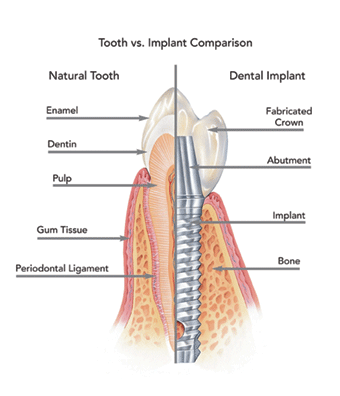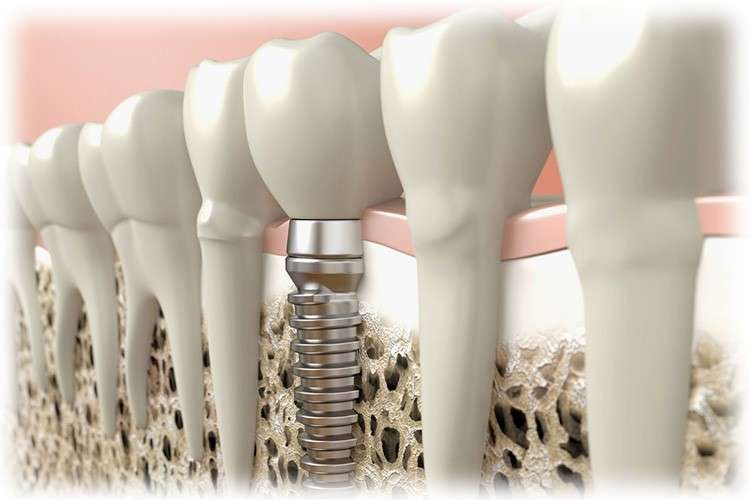Put simply, an implant is a post inserted into the jawbone onto which a crown can be placed to replace a missing tooth. But some may not know that not everyone is a viable candidate for a dental implant. There are, in fact, a number of criteria that must be met for an individual to be considered an excellent implant patient. Some factors that comprise a promising candidate include the ability to heal well, no smoking, and good volume of bone. Finally, the long-term prognosis of an implant depends upon a plethora of factors, including the ability of the patient to maintain the implant site and the patient’s susceptibility to gum disease and trauma from occlusion.
 When evaluating an implant candidate, I examine a multitude of factors to determine the long-term prognosis of the implant. Primarily, an excellent implant candidate will possess the ability to heal well. I check to see that they are not taking medication that will have a negative effect upon bone metabolism (the ability of bone to heal). Long-term medication for autoimmune diseases often has a negative effect upon bone volume, so I encourage minimal medication during implant placement and healing if possible.
When evaluating an implant candidate, I examine a multitude of factors to determine the long-term prognosis of the implant. Primarily, an excellent implant candidate will possess the ability to heal well. I check to see that they are not taking medication that will have a negative effect upon bone metabolism (the ability of bone to heal). Long-term medication for autoimmune diseases often has a negative effect upon bone volume, so I encourage minimal medication during implant placement and healing if possible.
Furthermore, if the patient is diabetic, I analyze whether the diabetes is controlled or uncontrolled. Poorly controlled diabetes causes sugar levels to fluctuate, weakening the immune system and slowing bone metabolism. Unregulated hyper or hypothyroidism inflicts comparable harm upon a patient’s prognosis for similar reasons.
Another consideration in determining the status of a potential implant patient is the patient’s history with periodontal disease. The existence of periodontal disease is a variable to evaluate because an implant will be less viable if the candidate is simultaneously battling other oral diseases. In addition, I look at whether individuals have lost teeth due to gum disease before. If they have, they may likely reject the implant too. Ideally, the patient should have minimal periodontal disease or is actively pursuing treatment for the disease.
Also, whether a patient smokes also weighs heavily upon an implant’s success or failure. This is because nicotine slows down bone metabolism, so it produces and heals less efficiently. Additionally, I look for sufficient width, height, and depth of the jawbone in which to place the implant. The jawbone must be adequately sturdy to maintain the implant and heal around the surgery area. Finally, I also analyze the bone’s ability to heal once the bone has been placed. These final factors can be determined by x-ray analysis, but sometimes 3-d imaging is necessary.
Although these factors weigh heavily upon a patient’s prognosis, there are ways a non-ideal candidate can increase their chances of a successful outcome. The patient can boost the probability of keeping an implant by getting his periodontal disease under control, minimizing the use of anti-inflammatory medication, and refraining from smoking. I can also perform bone augmentation to achieve better bone volume for implants in certain cases. Furthermore, I recommend that candidates with health problems get a physical to manage controllable factors such as sugar levels, thyroid, etc. You may need to discuss your overall health with your physician, and occasionally I require a physician’s permission for the implant procedure. Both myself and the patient must go into the procedure considering the risks unique to each patient so that we can alleviate potentially compromising factors prior to the procedure.
Some final factors exist that determine the long-term success of the implant placement even after I have determined that the patient is a strong candidate and after the implants have been placed. First, the patient must keep the implant area as free of bacteria as possible. This is achieved by the consistent removal of plaque from the neck of the implant through both home and professional cleaning. At home, remove plaque by flossing; the implant post needs to be buffed by wrapping the tooth with floss and buffing up and down and side to side.
Secondly, to facilitate the implant’s long-term success the patient must avoid inflicting trauma upon the implant site. Such trauma includes crunching ice, biting nails, and oral habits like chewing on pens or excessive gum chewing. While the natural tooth has ligaments that attach the root surface to the jaw bone to keep the tooth stable, the implant doesn’t have that ligament; the extra pressure from biting can affect the integration of the implant surface to the bone. Therefore, it is vital to avoid trauma to the implant area.

On the whole, many risk factors must be assessed and, if necessary, mitigated before I determine if a patient will be a viable implant candidate. I evaluate his or her ability to heal, medication consumption, history of diabetes or periodontal disease, nicotine consumption, and sufficient jaw bone around the implant area. Lastly, the patient can also ensure the continued health of the implant by consistently cleaning the implant site and by avoiding trauma from occlusion.

For more information on this topic, listen to the Gum Guru Podcast by clicking the link below:
